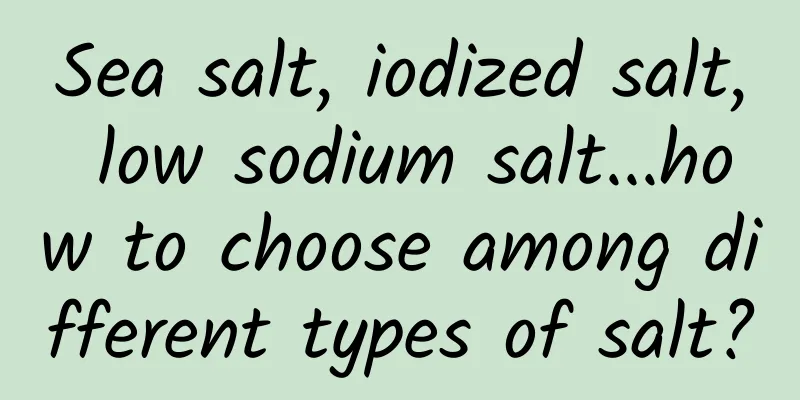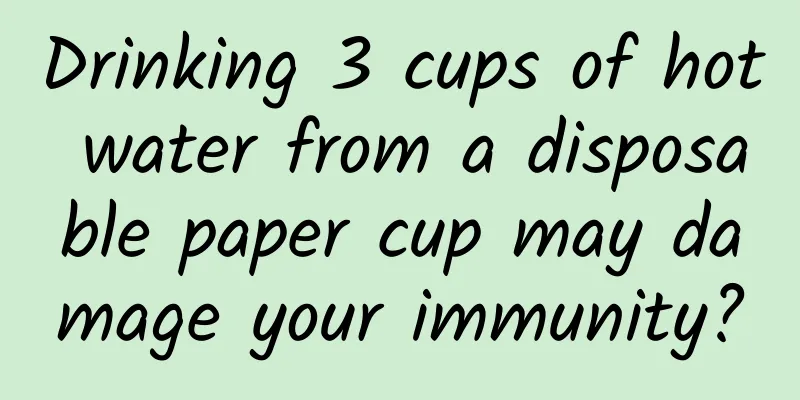Sea salt, iodized salt, low sodium salt...how to choose among different types of salt?

|
When you go to the supermarket to buy salt, you will see mineral salt, lake salt, sea salt, low sodium salt, iodized salt, non-iodized salt... How do you choose among the various salts? If we sort by "source and type", there are well salt, lake salt, and sea salt; if we sort by "ingredients", there are low-sodium salt, iodized salt, and non-iodized salt. Do different groups of people eat different salts? Check to see if you are eating the right salt! What is the difference between different types of salt? The sources of salt in my country are mainly divided into three categories: well salt, lake salt and sea salt. According to China Salt Industry Group, the current product structure of salt in my country is 87% well salt, 10% sea salt and 3% lake salt. Sea salt: It is made by introducing seawater into salt pans and then drying it in the sun, evaporating it, and crystallizing it. Lake salt (pond salt): salt directly extracted from salt lakes, or made from salt lake brine in salt pans; Mineral salt (rock salt): Mined from salt deposits, rock salt is buried 100 to 3,000 meters underground. Bamboo salt: Seal the coarse salt in a bamboo tube with yellow mud and calcine it at high temperature, which not only removes the impurities in the salt, but also leaves a hint of bamboo fragrance. Gu Chuanling, deputy secretary-general of the Capital Health, Nutrition and Gourmet Society, introduced that the quality of well salt is higher than that of lake salt and sea salt, because the raw materials of well salt come from natural brine and rock salt deposits below a thousand meters deep, so it is almost not polluted and has few impurities. How to choose salt with different ingredients? Although there are many types of salt and their prices vary, the three main types are marked according to the "Nutrient Composition Table": Sodium, iodine, potassium After the former Ministry of Health revised the "Standards for the Use of Food Nutrient Fortifiers" in 2012, nutrient fortifiers other than iodine are no longer allowed to be added to salt. 1. Low sodium salt - not recommended for people who do heavy physical labor or have kidney disease Low sodium salt is generally made from iodized salt, with a certain amount of potassium chloride added to improve the balance of sodium and potassium in the body and prevent high blood pressure. Of course, there are also low sodium salts without iodine. Ding Xia, deputy chief physician of the Nutrition Department of the Affiliated Hospital of Nantong University in Jiangsu Province, introduced that people who are not suitable for high potassium intake, such as those working in high temperatures, those doing heavy physical labor, those with renal dysfunction, and hypertensive patients taking antihypertensive drugs, should use low-sodium salt with caution. Jin Yuqian, a nutritionist at the Nutrition Department of the Zhejiang University Affiliated Shaw Hospital, explained that because some antihypertensive drugs have a potassium-retaining effect, low sodium salt relatively increases the potassium content, and blood potassium in the body is prone to increase. Common antihypertensive drugs include spironolactone, triamterene, captopril, valsartan, etc. If you are not sure what medicine you are taking, you can consult a specialist. 2. Iodized salt - suitable for most ordinary families Most of the salt we consume in our daily lives is iodized salt. The reason why iodine is added to table salt is that my country was once a country with a serious prevalence of iodine deficiency. Since 1996, my country has begun to implement iodized salt for all the people. There have been various opinions on the Internet about whether it is necessary to continue to consume iodized salt. Some people believe that my country has been supplementing iodine for so many years that there is no need to consume iodized salt, and the high incidence of thyroid cancer is related to iodine; others say that coastal areas eat a lot of seafood, so iodine can be supplemented by food; there are also views that iodine deficiency has serious consequences and iodine supplementation should continue. The Shanghai Municipal Health Commission once stated that there is currently no direct evidence that eating iodized salt or increasing iodine intake is related to the occurrence of thyroid cancer. Gu Chuanling, deputy secretary general of the Capital Health Nutrition and Gourmet Society, said that except for high-iodine areas where iodized salt is no longer available, other areas should continue to eat iodized salt, otherwise the risk of iodine deficiency is very high. For a small number of patients with hyperthyroidism, thyroiditis, autoimmune thyroid disease, etc., whether they can eat iodized salt depends on the doctor's advice. 3. Non-iodized salt: These two types of people are not recommended to eat Song Xiangyang, director of the Department of Thyroid and Breast Surgery at Zhejiang Provincial People's Hospital, pointed out that there are two types of people who are not suitable for consuming iodized salt: The first category is patients with thyroid diseases such as hyperthyroidism, thyroiditis, and autoimmune thyroid disease. Due to treatment needs, they can follow the doctor's advice and not eat or eat less iodized salt; The other group is residents living in high-iodine areas or non-iodine-deficient areas. They already get sufficient doses of iodine from food and drinking water every day. This group of people should not consume iodized salt either. It should be emphasized here that coastal areas are not necessarily high-iodine areas or non-iodine-deficient areas. Dr. Li Yong from the Institute of Nutrition, Medical College of Qingdao University, introduced that studies in coastal areas such as Fujian showed that when consuming iodized salt, the dietary iodine intake of adult men in different geographical regions of Fujian Province is generally appropriate and safe, and there is no problem of excessive iodine. Iodized salt is the main source of dietary iodine; it is even believed that if residents of coastal cities do not eat seaweed foods, they will face the risk of iodine deficiency even if they eat iodized salt. |
<<: Take stock of the liquid milk family
Recommend
Is it normal for a woman to have her period for 20 days?
Generally, the menstrual interval between women i...
How long does it take for a woman to feel pain after a cesarean section?
With the development of medical technology and co...
Why does vagina itch and bleed?
As sex life becomes more open, women's health...
World Bipolar Disorder Day丨They are neither geniuses nor crazy...
Today, March 30, is World Bipolar Disorder Day. M...
Can pregnant women drink Xiasangju granules?
At first glance, "Xiasangju" seems to b...
What causes cervical erosion?
Cervical erosion is a very common gynecological d...
What should I pay attention to during pregnancy?
In modern society, for modern families, having ch...
What causes nipple pain in women?
In life, many women will encounter symptoms of ni...
How many of these rumors about milk do you believe?
Author: Han Lu, Associate Researcher, Chinese Cen...
How to fix the fishy smell in duck soup How to fix the fishy smell in duck soup
We all know that duck soup is a common nourishing...
Is it painful to do TCT and HPV?
With the improvement of people's health aware...
What to do if you have stomachache, bloating and hiccups? There are ways to regulate your stomach
Hiccups are a very common physiological phenomeno...
My father passed on to me a "cancer susceptibility gene"
A big girl was admitted to the ward. "Big gi...
Can I really use Band-Aids during pregnancy?
In life, it is inevitable to encounter some bumps...
Reproductive examination
Female genitalia examination refers to the expose...









